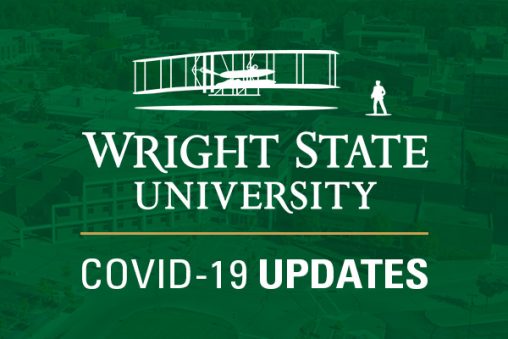Wright State University announced Sept. 1 that the university has its first positive COVID-19 cases of the 2020–21 academic year. Four students and one employee, all from the Dayton Campus, have self-reported that they have tested positive for COVID-19.
Confidentiality laws prohibit disclosure of individuals’ identities. Anyone believed to have been in close contact with the infected individuals will be contacted.
Wright State is following its protocols for a confirmed case of COVID-19.
Fall semester classes began Aug. 24 with a combination of remote, flexible delivery, and safe, socially distant, in-person classes.
To keep the campus community, families and the public informed, Wright State launched a COVID-19 Dashboard that shows all active COVID-19 cases. The dashboard is available at wright.edu/covid-dashboard.
The university’s goal is to update the dashboard twice weekly, on Mondays and Thursdays, when new data is available to report.
The dashboard reflects the number of positive COVID-19 cases and is regularly updated when the Wright State Department of Environmental Health and Safety is able to verify reports. The Department of Environmental Health and Safety (EHS) collects this information from several sources, including Student Health Services at Wright State Physicians, public health agencies, and the university’s COVID-19 Self-Reporting portal.
The dashboard includes cases that were confirmed by a county health department, as well as those that were self-reported.
A case is considered confirmed when the home county health department of an individual who has tested positive for COVID-19 has notified the EHS and is working with the university to commence contact tracing because the individual is believed to have been on campus recently.
In a self-reported case, a Wright State student or employee who may or may not have been on campus recently has self-reported that they have tested positive to the Department of Environmental Health and Safety, their supervisor, Wright State employees in Residence Life and Housing, or other university professionals who have then notified EHS. Self-reported cases can also include instances where a student or employee has engaged in testing through Student Health Services or Wright State Physicians, tested positive, and those results were shared with EHS. Self-reported cases may also come from surveillance testing of students and employees.
Anyone in the campus community who tests positive for COVID-19 is asked to self-report through the COVID-19 Self-Reporting Form. Gathering testing information from across the university allows the Department of Environmental Health and Safety to understand patterns in community spread and make informed decisions to keep community members safe.
“With the holiday weekend approaching, I ask each of you to remain vigilant in helping stop the spread of COVID-19,” interim Provost Douglas Leaman asked students and employees in an email to campus. “We must all work together. Thank you for helping keep our Wright State community safe.”
Every member of the Wright State community is reminded to continue to actively practice preventive measures, including wearing a face covering, practicing appropriate physical distancing, and employ good hygiene practices. Employees and students are expected to follow health and safety protocols required on the Wright State University campus.


 Wright State student-athletes make a lasting impact on local family, more to come
Wright State student-athletes make a lasting impact on local family, more to come  Wright State names Rajneesh Suri dean of Raj Soin College of Business
Wright State names Rajneesh Suri dean of Raj Soin College of Business  ‘Only in New York,’ born at Wright State
‘Only in New York,’ born at Wright State  Wright State president, Horizon League leaders welcome new commissioner
Wright State president, Horizon League leaders welcome new commissioner  Wright State celebrates homecoming with week-long block party
Wright State celebrates homecoming with week-long block party 